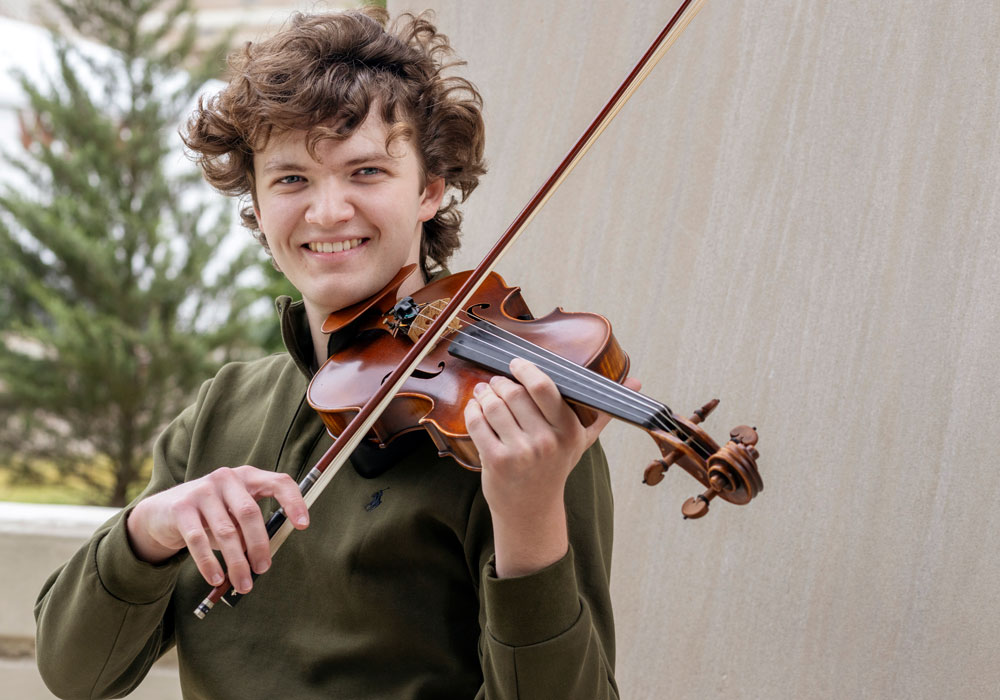video loop of a man playing a violin outside
Aidan Billings followed his head and his heart when he came to the University of South Carolina.
First, his head: Mechanical engineering, which would allow him to explore sustainable energy and to participate in research projects.
Second, his heart: Music performance — violin.
Billings, who also is in the South Carolina Honors College, didn’t think a career as a musician would provide the income he wanted for his life, so he chose engineering for that aspect. But the second violinist in USC’s Symphony Orchestra says he loves playing classical music and does it professionally with several orchestras in the state.
“I think that people who are successful in music are often successful in other things as well,” says Billings, who attended the Charleston County School of the Arts before coming to USC. “And so we have quite a community of people that are double majors between music and something outside of music entirely.”
For Billings, that outside-of-music degree is mechanical engineering with a focus on materials and sustainability. His interests lined up with the lab of Kevin Huang, a SmartState endowed chair and director of the Center of Solid Oxide Fuel Cells. Billings found the research opening as a freshman.
“I've never been one to be scared for academic opportunities,” he says. “I started cold emailing professors that were doing things that sounded cool to me. And one of them accepted me on the spot from my email.”
Huang’s research focuses on developing functional materials and understanding fundamental issues of electrochemical cells including fuel cells, batteries and gas separation membranes. As the only undergraduate in the lab, Billings was paired with a post-doctoral fellow and found his calling.
“I couldn't have gotten luckier because I didn't know anything about what I wanted or how to look for it,” Billings said. “He was a great mentor. And I think that I wouldn't be going for a Ph.D. if it weren't for him.”
Huang says Billings emailed him looking for an opportunity at the same time Huang was looking to include an undergraduate on a project he was working on for the U.S. Army.
“It was all timing,” says Huang, adding that Billings is the best undergraduate researcher he has ever had in his lab. “I thought this is good candidate because he's motivated, he's interested, and he's from the Honors College.”
What started as a summer internship after his freshman year ended up being a nearly three-year stint in Huang’s lab that included publishing research with the professor.
“He's a quick learner,” Huang says. “And later on, I had to use him to make some engineering drawings for us.”
Huang says Billings even played his violin at end-of-the-semester gatherings for the research team. Huang’s only disappointment was being unable to convince Billings to stay in Columbia for graduate school.
Instead, Billings plans to attend Georgia Tech for a Ph.D. in engineering with an eye toward becoming a professor and researcher himself.
He spent last summer in Berlin, doing modeling research at the Deutscher Akademischer Austauschdienst or the DAAD, an organization that focuses on student exchanges particularly between Germany and the U.S. and sustainable development.
His lab experiences at USC led Billings to become an ambassador for the Office of Undergraduate Research.
“I thought that undergraduate research was really, really good to me,” he says. “It allowed me to travel internationally for the first time. It informed my future career. It gave me the experiences that allowed me to be successful in grad school applications.
“I wanted to pass on that opportunity to students that maybe wouldn't hear about it otherwise.”
As he wraps up his USC career, Billings is working on a final capstone project — redesigning the sifter for the archaeology department. Archaeologists use sifters to search for small objects trapped in layers of dirt.
“The current sifter is a little bit cumbersome because it's been around for so long,” Billings says. “The archaeologists typically don't have a ton of funding, so they look to make it as cheaply as possible. We don't quite have the cost restraint that they would normally because it's through the capstone project.”
So what makes a better sifter? One that can stand on its own, that is lighter weight with more ergonomic handles to avoid blisters.
“So we're making it with some parts made out of aluminum, which is quite a bit lighter. We are redesigning the handles so that there's many different options on how to hold it, and all of them fit hands a little bit better. It's also freestanding so students can leave it to go grab a water bottle or scoop more dirt into it or anything like that.”
